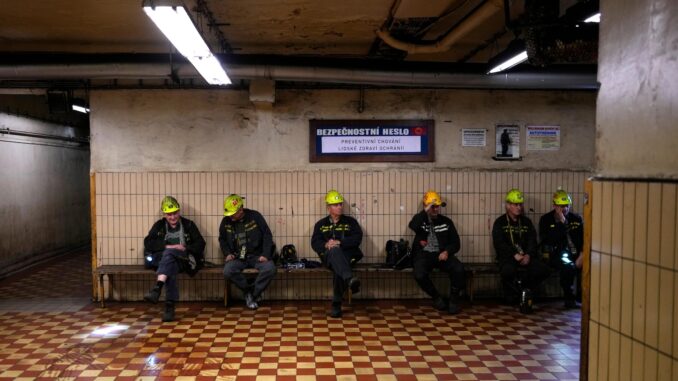
STONAVA, Czech Republic — Deep underground in northeastern Czech Republic, workers in the region’s last-functioning coal mine drill, load and haul the fuel up to the surface.
The CSM mine is part of the Upper Silesian Coal Basin, a region straddling the Czech-Polish border with a 250-year history of mining because of its rich coal deposits and factories that produce steel and energy.
With just the light of a headlamp, workers — their bodies and clothes covered in soot and dust — effortlessly navigate the mines, drilling the deposits underground. Others load cars to take the rocks to the surface, where huge piles of it lie ready to be transported to power plants.
The work comes with a price: A 2021 study of more than 800 European cities by the Barcelona Institute for Global Health puts the regional capital of Ostrava and the nearby towns where the mine is located among the top 10 most polluted European cities.
And when burned for energy, coal contributes to the carbon dioxide emissions warming up the atmosphere, altering weather worldwide and burning up the planet.
Some — but not all — of the workers in the mines wore face masks, providing some protection from the sooty particles that swirled around the air. But the masks, too, were covered in grime.
An energy crunch two years ago — caused by the European Union’s ban of Russian coal over the war in Ukraine made the government reverse plans to completely halt mining in the region. Coal-fired power plants producing some 40% of the country’s electricity, about three time more than the EU’s average.
The Czech state-owned OKD company extended its mining activities in the CSM mine. Some 3,500 employees will remain excavating the mines of their energy-rich coal at least until early 2026.
The Czech government aims to phase out coal in energy production by 2033 and increase the country’s reliance on nuclear power and renewable sources.
___
The Associated Press’ climate and environmental coverage receives financial support from multiple private foundations. AP is solely responsible for all content. Find AP’s standards for working with philanthropies, a list of supporters and funded coverage areas at AP.org.


Be the first to comment